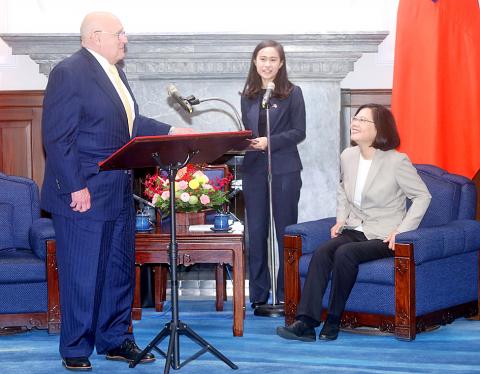Taiwan’s future should be determined by its nearly 24 million citizens without outside influence, Project 2049 Institute chairman Richard Armitage yesterday told a meeting attended by President Tsai Ing-wen (蔡英文), institute president John Gastright and other institute members.
Minister of Foreign Affairs Joseph Wu (吳釗燮) and National Security Council Secretary-General David Lee (李大維) also joined the meeting at the Presidential Office, part of which was broadcast on Tsai’s Facebook page.
Calling Armitage — who served as US deputy secretary of state during former US president George W. Bush’s first term in office — an old friend of Taiwan and hers, Tsai said she was glad to meet him again after his visit last year.

Photo: CNA
She also thanked him for introducing her during a videoconference she held with the Washington-based Center for Strategic and International Studies, the Brookings Institution and the Woodrow Wilson International Center for Scholars on April 9 as part of an event marking the 40th anniversary of the US’ Taiwan Relations Act.
The US remains Taiwan’s most important strategic and economic ally, and the two nations have worked closely on security and economic affairs over the past three years, with bilateral relations at their best ever, Tsai said.
The US government has announced three arms sales packages for Taiwan, and US Secretary of Health and Human Services Alex Azar last month spoke out for Taiwan’s participation at the World Health Assembly in Switzerland, she said.
Tsai said she is continuing to work with the US on the challenges to a free and open Indo-Pacific region.
Armitage told the president that he was happy to continue renewing his 20-year friendship with Taiwan and hear Tsai’s discussion of the aspirations of Taiwanese during a private talk they had held earlier in the day.
The delegation was not in Taiwan to ask for anything, except to say that “Taiwan has to determine her own future, and almost 24 million citizens of Taiwan have to have a free, open [and] democratic process” to make that decision, he said.
The institute’s members would dedicate themselves to ensuring that process happen without being affected by any outside forces, Armitage added.
The 11-year-old Arlington, Virginia-based institute is a non-profit research organization that focuses on promoting US values and security interests in the Indo-Pacific region.
Gastright also served as a deputy US assistant secretary of state, among other positions he held at the US Department of State before joining the private sector.
Additional reporting by staff writer

A car bomb killed a senior Russian general in southern Moscow yesterday morning, the latest high-profile army figure to be blown up in a blast that came just hours after Russian and Ukrainian delegates held separate talks in Miami on a plan to end the war. Kyiv has not commented on the incident, but Russian investigators said they were probing whether the blast was “linked” to “Ukrainian special forces.” The attack was similar to other assassinations of generals and pro-war figures that have either been claimed, or are widely believed to have been orchestrated, by Ukraine. Russian Lieutenant General Fanil Sarvarov, 56, head

SAFETY FIRST: Double the number of police were deployed at the Taipei Marathon, while other cities released plans to bolster public event safety Authorities across Taiwan have stepped up security measures ahead of Christmas and New Year events, following a knife and smoke bomb attack in Taipei on Friday that left four people dead and 11 injured. In a bid to prevent potential copycat incidents, police deployments have been expanded for large gatherings, transport hubs, and other crowded public spaces, according to official statements from police and city authorities. Taipei Mayor Chiang Wan-an (蔣萬安) said the city has “comprehensively raised security readiness” in crowded areas, increased police deployments with armed officers, and intensified patrols during weekends and nighttime hours. For large-scale events, security checkpoints and explosives

PUBLIC SAFETY: The premier said that security would be tightened in transport hubs, while President Lai commended the public for their bravery The government is to deploy more police, including rapid response units, in crowded public areas to ensure a swift response to any threats, President William Lai (賴清德) said yesterday after a knife attack killed three people and injured 11 in Taipei the previous day. Lai made the remarks following a briefing by the National Police Agency on the progress of the investigation, saying that the attack underscored the importance of cooperation in public security between the central and local governments. The attack unfolded in the early evening on Friday around Taipei Main Station’s M7 exit and later near the Taipei MRT’s Zhongshan

REBUFFED: In response to Chinese criticism over recent arms sales, Washington urged Beijing to engage in meaningful dialogue instead of threats and intimidation Washington’s long-term commitment to Taiwan would not change, the US Department of State said yesterday, urging Beijing to stop pressuring Taiwan and engage in meaningful bilateral dialogues. The remarks came in response to a backlash from Beijing about Washington’s latest approval of arms sales to Taiwan. The US Defense Security Cooperation Agency said in a statement on Wednesday that the Taipei Economic and Cultural Representative Office in the US has asked to purchase an arms package, including Tactical Mission Network Software; AH-1W helicopter spare and repair parts; M109A7 self-propelled howitzers; HIMARS long range precision strike systems; tube-launched, optically tracked, wire-guided missiles; Javelin